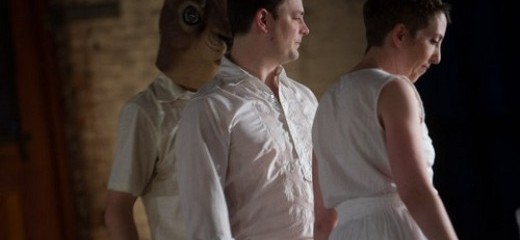
© Jacques-Jean Tiziou/www.jjtiziou.net
In 1993, When We Felt Free
by Kilian Kröll
It’s not as easy as it was
Or as difficult as it could be
For a samurai in autumn.
Twenty years after their first pop hit, the Pet Shop Boys released a song that alluded to the band’s ambivalent position in the music industry after decades of collaboration. Had they become too comfortable with their artistic process? Or were they not as comfortable as they thought they’d be by now?
These are some of the core questions
Headlong Dance Theater asks in its new work,
Desire. Two decades and 40 dances into their career, the darlings of Philly’s theatrical dance world in the 1990s and 2000s have arrived at a point of mid-life reflection. For the first time since 2007’s
Explanatorium, Amy Smith, Andrew Simonet and David Brick reunite as performers on stage. Confident in their ability to galvanize a doting community around their art, yet surprisingly reliant on stories and songs of yesteryear, the creators of
Desire strike a nostalgic vein.
An onion rolls across the stage. That’s how the dance starts, and immediately I get a sense that Desire is about peeling off layers of history. Three tent-like boxes occupy the scene, a dancer crouched in each. Smith emerges from her tent humming a melancholy tune. When Simonet joins her strumming his guitar, she starts singing in earnest. It’s Sinead O’Connor’s “Troy.” About a third of the audience seems to recognize the lyrics and chuckles hard: “The flames burn away/ but you’re still spitting fire.” The rest of us were either too young in 1987 when this song was released to fully understand the humor or else are missing some other inside joke.
The production alternates between intentionally funny dances set to pop tunes and poetic spoken reflections. Director K. Elizabeth Stevens (also: married to Simonet) sets up an organic patchwork of personal memories and cultural references. The three performers converse about graduating from college and starting their dream of communal art-making. Amy says: “Remember how we used to plant onions when we lived at the farm house?”
Smith reminisces about shoplifting expensive vegan parmesan cheese that didn’t taste very good. Being glib about soft criminal activity irks me as a sign of unquestioned privilege, reserved for those who can assume they won’t be prosecuted. (Cf. Miranda July’s pontification
in the New Yorker on feeling freedom through shoplifting.) We hear Fleetwood Mac, then Thom Yorke, R.E.M. and the original rendition of “I Want A Hippopotamus For Christmas.” In one of the most compelling physical scenes, the three carefully synchronize a movement pattern they got from filming one of their kids (see
TD interview with Stevens). Later on, Brick opens the door to the street, lights a cigarette and leans against the doorframe looking back dreamily, vacantly at the activities on the stage.
Desire employs songs, texts and sensory experiences to trigger strong memories in some audience members, especially in those, it seems, who’ve known Headlong for some time. One Headlong peer remarked to me afterwards with tears in his eyes that he was reminded of the innocent idealism he felt when he – inspired by Brick, Smith and Simonet – started his own theater company in the late ‘90s, as well as of the commitment, hardships and struggles to keep it going after all these years. If nothing else, the Headlong directors’ artistic marriage to each other shines through as an intimate, palpable reality: they devised Artist U to empower and sustain Philly artists, birthed the
Headlong Performance Institute, and all three are now raising families of their own.
However, to someone who doesn’t recognize the personal import of the song lyrics, the references to cooking onions on a farm or the irony about Brick’s (deaf) parents owning a piano, Desire is muffled in a nostalgia that perhaps marks the end of an era. From an outsider’s perspective, the piece comes across as private, insular, and somewhat non-transferable to new audiences. It makes me long to see one of their older works again, such as Hotel Pool or Cell, tactile experiences that I can easily recall years later.
Even two decades after they released “West End Girls,” their first and most recognized single to date, the Pet Shop Boys say that “pop music is about now, maybe about tomorrow.” But Headlong’s latest work shows that arriving, fully awake, in 2012 is a struggle when the dream of the ‘90s took some unexpected turns. Desire pays homage to a community which the company has both cultivated and served since its inception. For the rest of us, the operative question is: What now?
Desire, Headlong Dance Theater, The Performance Garage, May 4-6, 2012.
By Kilian Kröll
May 9, 2012

